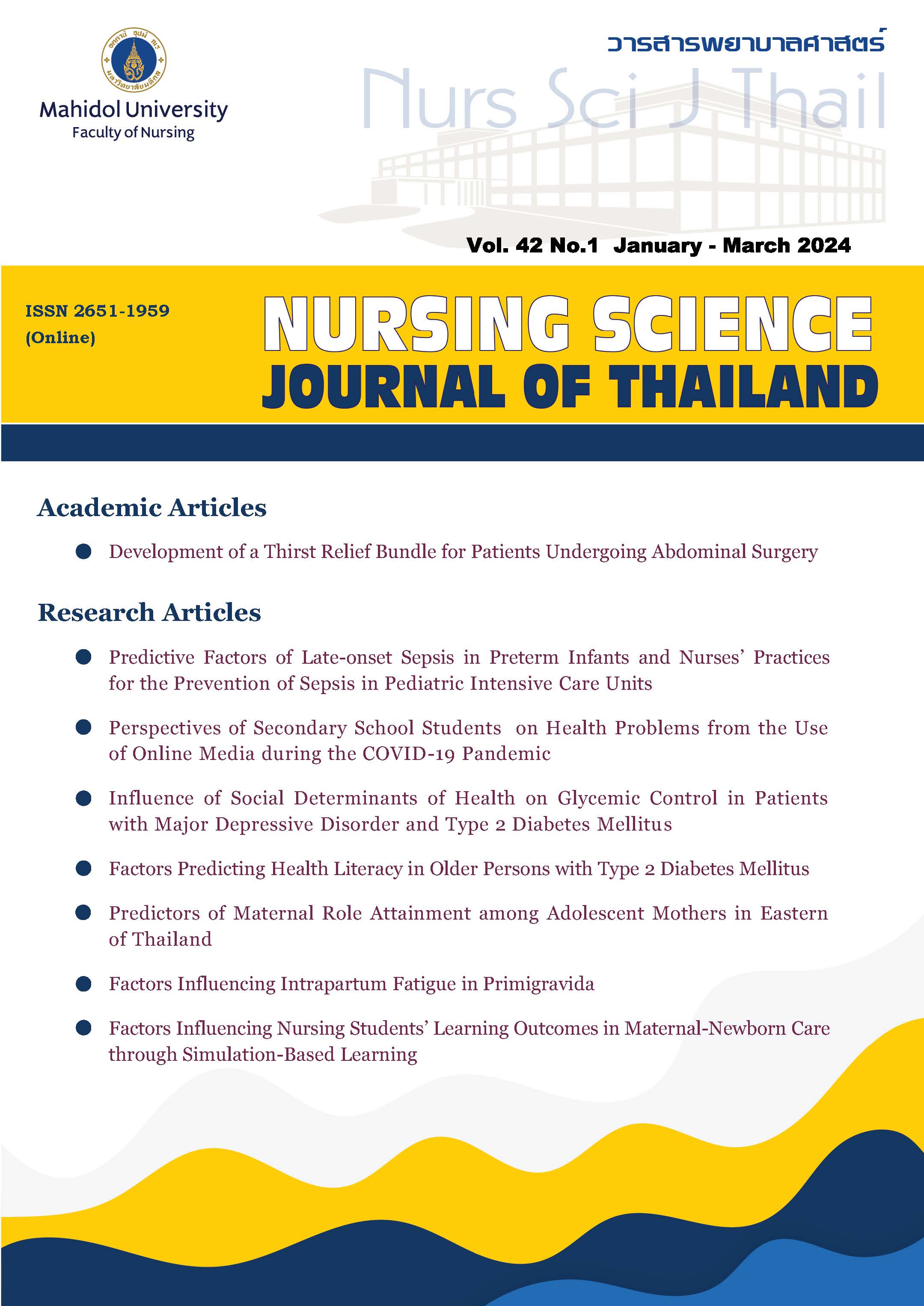Factors Predicting Health Literacy in Older Persons with Type 2 Diabetes Mellitus
Main Article Content
Abstract
Purpose: To investigate predictability of selected factors including age, gender, education, income, visual acuity and family support on health literacy in older persons with type 2 diabetes mellitus.
Design: Correlational predictive research.
Method: Participants were 146 older persons with type 2 diabetes mellitus aged 60 years and older who met the inclusion criteria and attended the outpatient department at a tertiary care hospital. Data were collected using demographic data, health literacy in older persons with type 2 diabetes and family support questionnaires. Data were analyzed by using descriptive statistics and multiple regression analysis.
Main findings: The results showed that all of the independent variables could account for 79.4% of the variance explained in health literacy in older persons with type 2 diabetes (adj R2 = .79). Family support ( = .50, p < .001), education (
= .30, p < .001) and visual acuity (
= .24, p < .001) were statistically significant predictors of health literacy in older persons with type 2 diabetes mellitus while age, gender and income were not.
Conclusion and recommendations: Family support, education and visual acuity were predictive factors of older persons with type 2 diabetes mellitus. Thus, the health care team should take screening assessments of education level and visual acuity to provide an appropriate activity in conjunction with accessing the level of family support to encourage family involvement in health activities to enable older persons with type 2 diabetes mellitus to develop their health literacy effectively.
Article Details

This work is licensed under a Creative Commons Attribution-NonCommercial-NoDerivatives 4.0 International License.
Copyright Notice: Nursing Science Journal of Thailand has exclusive rights to publish and distribute the manuscript and all contents therein. Without the journal’s permission, the dissemination of the manuscript in another journal or online, and the reproduction of the manuscript for non-educational purpose are prohibited.

Disclaimer: The opinion expressed and figures provided in this journal, NSJT, are the sole responsibility of the authors. The editorial board bears no responsibility in this regard.
References
Introduction: Standards of medical care in diabetes 2019. Diabetes Care. 2019;42 Suppl 1:S1-S2. doi: 10.2337/dc19-Sint01.
Karnjanapiboonwong A. NCDs situation report 2019 diabetes hypertension and related risk factors. Bangkok: Aksorn Graphic and Design Publishing Limited Partnership; 2020. 87 p. (in Thai).
Jiamrasrangsi W. Type 2 diabetes: prevention and self-management support. Bangkok: Chulalongkorn University Press; 2018. 362 p. (in Thai).
Stormacq C, Wosinski J, Boillat E, Van den Broucke S. Effects of health literacy interventions on health-related outcomes in socioeconomically disadvantaged adults living in the community: a systematic review. JBI Evid Synth. 2020;18(7):1389-469. doi: 10.11124/JBISRIR-D-18-00023.
Tachavijitjaru C. Health literacy: a key indicator towards good health behavior and health outcomes. Journal of The Royal Thai Army Nurses. 2018;19 Suppl 1:1-11. (in Thai).
Srisaeng P, Deenamjued W. Health literacy of healthy aging among elderly in Bangkok metropolitan: development and validation of health literacy scale. Journal of The Royal Thai Army Nurses. 2019;20(2):340-50. (in Thai).
Wongnisanatakul K. Health literacy among diabetic patients at the family practice center of Phra Nakhon Si Ayutthaya hospital. Journal of Preventive Medicine Association of Thailand. 2018;8(1):49-61. (in Thai).
Panurat S, Bhoosahas P, Thutsaringkarnsakul S, Krachangpho P, Thuratham W, Natetipawan P. Factors related to health literacy among the elderly in Pak Phli district, Nakhon Nayok province. Journal of The Police Nurses. 2019;11(1):86-94. (in Thai).
Nilnate W, Hengpraprom S, Hanvoravongchai P. Level of health literacy in Thai elders, Bangkok, Thailand. Journal of Health Research. 2016;30(5):315-21. doi: 10.14456/jhr.2016.43.
Xie Y, Ma M, Zhang Y, Tan X. Factors associated with health literacy in rural areas of Central China: structural equation model. BMC Health Serv Res. 2019;19(1):300. doi: 10.1186/s12913-019-4094-1.
Jandorf S, Krogh Nielsen M, Sørensen K, Sørensen TL. Low health literacy levels in patients with chronic retinal disease. BMC Ophthalmol. 2019;19(1):174. doi: 10.1186/s12886-019-1191-1.
Kanthawee P, Pongpanich S. The study of health literacy among elderly people, Pa teung sub-district, Mae Chan district, Chiang Rai province. Chiang Rai Medical Journal. 2019;11(1):73-83. (in Thai).
Thangkratok P, Boonpradit P, Palacheewa N. Factors predicting health literacy among older adults with chronic diseases in community. Thai Journal of Cardio-Thoracic Nursing. 2022;33(1):215-30. (in Thai).
Warren M, DeCarlo DK, Dreer LE. Health literacy in older adults with and without low vision. Am J Occup Ther. 2016;70(3):7003270010p1-7. doi: 10.5014/ajot.2016.017400.
Squiers L, Peinado S, Berkman N, Boudewyns V, McCormack L. The health literacy skills framework. J Health Commun. 2012;17 Suppl 3:30-54. doi: 10.1080/10810730.2012.713442.
Polit DF, Beck CT. Nursing research: generating and assessing evidence for nursing practice. 11th ed. Philadelphia, PA: Wolters Kluwer; 2018. 814 p.
Trongsakul S, Lambert R, Clark A, Wongpakaran N, Cross J. Development of the Thai version of Mini-Cog, a brief cognitive screening test. Geriatr Gerontol Int. 2015;15(5):594-600. doi: 10.1111/ggi.12318.
World Health Organization. International classification of impairments, disabilities, and handicaps: a manual of classification relating to the consequences of disease, published in accordance with resolution WHA29.35 of the twenty-ninth World Health Assembly, May 1976. Geneva: WHO; 1980. 207 p.
Ngamampornnara P, Sukonthasaba S. Health literacy for patients with type 2 diabetes in Bangkok metropolits and perimeter. Journal of Health, Physical Education and Recreation. 2020;46(2):68-79. (in Thai).
Phetarvut S, Watthayu N, Suwonnaroop N. Factors predicting diabetes self-management behavior among patients with diabetes mellitus type 2. Nursing Science Journal of Thailand. 2012;29(4):18-26. (in Thai).
Miller CA. Nursing for wellness in older adults. 8th ed. Philadelphia: Wolters Kluwer Health; 2018. 630 p.
Trainattawan W, Wirojratana V, Watanakukrilert D. Factors influencing health literacy among older adults. Journal of Health Science Research. 2019;13(2):41-51. (in Thai).
Seifollahzadeh S, Motalebi SA, Amirzadeh Iranagh J, Mafi M, Mohammadi F. Predictors of health literacy in community-dwelling elderly. Social Health and Behavior. 2019;2(4):139-44. doi: 10.4103/SHB.SHB_27_19.


